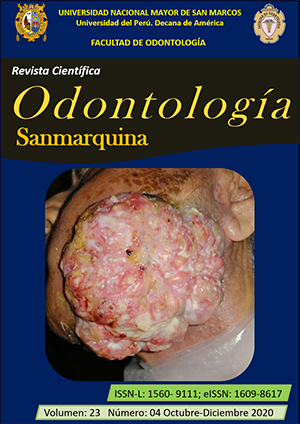Temporomandibular disorders in children and its relation to artificial lactation with bottle-feeding
DOI:
https://doi.org/10.15381/os.v23i4.19101Keywords:
Children, Sucking behaviors, Facial asymmetry, Temporomandibular disorders, Pediatric Dentistry, (source: MeSH NLM)Abstract
Objective. To establish the relationship of temporomandibular disorders (TMD) in children aged 8 to 10 years, with exclusive artificial feeding. Methods. Case-control study (matched by age and sex). 38 children were included, without growth disturbances or severe oral parafunctions, with prior informed consent (mothers) and assent (children). Participants were diagnosed with TMD (19 cases) or without TMD diagnosis (19 controls) using the Diagnostic Criteria for TMD (CD / TMD), after standardization by the researcher; kappa inter 0.98 and intraobserver 0.73. The history of breastfeeding was recorded with an express questionnaire: type and time of administration, and general data of the child and the mother. Descriptive and inferential statistics were calculated; Chi square analysis was performed to identify the association between TMD and exclusive artificial feeding, and odds ratio (OR), with a significant value of ≤0.05. Results. Age 8.95 ± 0.84 years, 57.9% male, with no differences in age or education of the mother between groups (p> 0,05). The most common type of TMD was muscle pain (57.9%), followed by disc luxation with reduction and combination (21.1%). The mean mouth opening, muscle and joint pain sites were statistically different between cases and controls (p <0.05). The percentage of exclusive artificial feeding was the same in both groups (57.9% p = 1.00), the calculated OR was 1 with a 95% CI of 0.27-3.60. Conclusions. Artificial feeding with the use of a bottle was not related to TMD. The most common type of TMD was muscle pain.
Downloads
Downloads
Published
Issue
Section
License
Copyright (c) 2020 Irene Espinosa-De Santillana, Lilian Ortega-Oviedo, Gabriel Muñoz-Quintana, Teresita Romero-Ogawa, Indiana Torres-Escobar

This work is licensed under a Creative Commons Attribution-NonCommercial-ShareAlike 4.0 International License.
AUTHORS RETAIN THEIR RIGHTS:
a. Authors retain their trade mark rights and patent, and also on any process or procedure described in the article.
b. Authors retain their right to share, copy, distribute, perform and publicly communicate their article (eg, to place their article in an institutional repository or publish it in a book), with an acknowledgment of its initial publication in the Odontología Sanmarquina.
c. Authors retain theirs right to make a subsequent publication of their work, to use the article or any part thereof (eg a compilation of his papers, lecture notes, thesis, or a book), always indicating the source of publication (the originator of the work, journal, volume, number and date).






